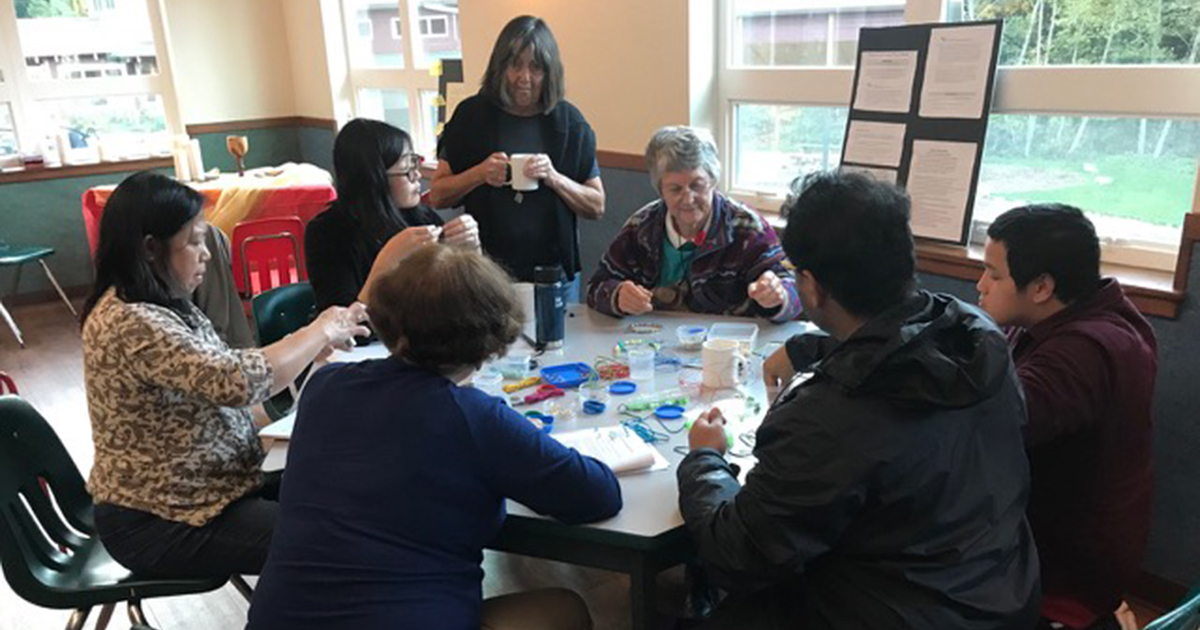The Diocese of New Westminster is garnering positive reviews from participants in its Lay Spiritual Renewal pilot project—a “uniquely Anglican” retreat weekend that organizers are hoping will expand into a nationwide program for spiritual formation.
Pro Mundi Vita—a Latin term meaning “For the Life of the World”—saw its first two retreat weekends last October at Camp Elphinstone in Gibsons, B.C. Approximately 12 participants attended the first retreat from Oct. 13-15, while 17 participated in the second retreat from Oct. 27-29.
The third and final retreat weekend of the pilot phase will take place from Feb. 23-25 at Loon Lake Lodge and Retreat Centre in Maple Ridge, B.C. Spaces for the third weekend are now sold out, with project coordinator Pamela McElheran creating a wait list due to strong interest.
“What’s happened is that the word is out there,” McElheran said. “People now want to come because they’ve heard it’s good … I think the feedback that we’ve received says that it really has opened up new avenues of prayer and connection, and deepening of faith for people.”
Diocesan program
The origins of Pro Mundi Vita lay in a diocesan working committee formed in 2015 after a meeting to discuss the three-day Cursillo program, which had been offered by the Diocese of New Westminster in the 1990s.
Feedback on the Cursillo program suggested that there was strong support for a new Lay Spiritual Renewal program in the diocese. The working committee in response established Pro Mundi Vita, applying for and gaining sponsorship from the Anglican Church of Canada, the Anglican Foundation, and the Diocese of New Westminster.
The retreat is tied together by the morning and evening prayers of the daily office, interspersed with exercises based on the practice of Lectio Divina. Outdoor and indoor activities include prayer walk stations in which participants view various written and audio-visual materials as a starting point for prayer and individual reflection.
Contemplation by individual participants is often followed by small group discussion. Art and music is a major element of the retreat, incorporating singing and projects such as making prayer beads. Evening worship services take place around a campfire to further prayerful contemplation.
Strengthening prayer life
Participants encompass a wide range of age and backgrounds. Ebey Masillamanie, a Langara College student and parishioner at St. Cuthbert Anglican Church in Delta, B.C. first heard about Pro Mundi Vita through a discussion with rector Paul Woehrle.
Having attended similar retreats previously in his home country of India, Masillamanie, 28, saw Pro Mundi Vita as a chance to become closer to God and learn more about prayer, spiritual well-being, and how God had transformed the lives of others.
“I would say it strengthened my prayer life,” Masillamanie said of the retreat. “It also gave me a thought to realize that I’m not really spending as much time as I should spend with God.”
One of the biggest lessons he took from the weekend was the value of silence in prayer, and how one can glorify God through even the smallest acts.
“I learned from that retreat that sometimes you don’t really have to talk everything to God,” Masillamanie. “You just sit and listen to him, and maybe you learn something.”
“I never used to do that,” he added. “I used to always just pray and just leave, but I never had a mentality to sit quietly just for a few minutes to listen to what he’s trying to say.”
Sharon McElroy, a parishioner at St. Hilda’s Anglican Church in Sechelt, B.C. left the retreat with a new appreciation for the different forms of prayer.
“I think the highlight of the whole thing was the wide diversity of ways they showed us that a person can pray,” McElroy said. “There are so many different ways to do it, and I’ve always found prayer kind of difficult—like, what are you supposed to say? What are you supposed to do? Who are you praying to?
“All of those questions were handled and we talked about them … It became apparent that you didn’t have to use words to pray, and I really liked that concept.”
Though she has not always prayed regularly in her life, McElroy found herself praying daily and often at the retreat. She has since kept up the habit, describing her experience of prayer as “a little bit deeper and a little richer now.”
Attending Pro Mundi Vita, she said, has given her “a whole lot of encouragement about the path that I’ve been on, that I’m moving in the right direction” in terms of spiritual formation.
“I’m going on 76 years old,” McElroy said. “It’s been a long journey to have a personal relationship with God. People always talked about it to me; I never had it.
“So this has really helped me feel that, to feel into it, and realize I didn’t have to have some kind of epiphany or something—that it can be a very gentle experience of praying and being in contact with the divine.”
Nationwide aspirations
Part of funding for Pro Mundi Vita allowed for three initial pilots to tweak and refine the program.
Following the third retreat in February, its coordinators are hoping that the materials and format of the retreat might eventually be replicated by Anglicans across the country. A fourth retreat is expected to take place in the Diocese of New Westminster this fall.
“We’re trying to develop a tool that other churches or other dioceses can use for spiritual formation,” project lead Eric Mason said.
At the moment, he added, “We’re still in the development on how to disseminate it and present it to the wider church. Right now we’re working on developing the retreat itself so that it becomes something that we can pass on.”
Interested in keeping up-to-date on news, opinion, events and resources from the Anglican Church of Canada? Sign up for our email alerts .

